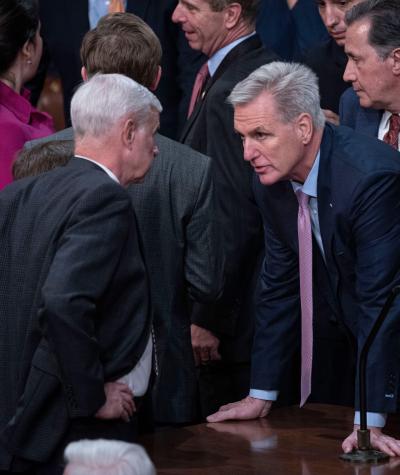Kevin McCarthy became Speaker of the House of Representatives — one of the highest roles in our government and second in line to the Presidency — in a dramatic five-day, fifteen-round marathon of votes that highlighted the stark, rancorous divisions in his caucus.
Largely overshadowed by the drama of McCarthy’s bid to become Speaker was a backroom “deal” between two outside spending groups, one of which is a super PAC closely associated with McCarthy, to get him across the finish line. The arrangement between these groups serves as a stark illustration of the overwhelming and harmful influence wealthy special interests have on the American political system.
Independent expenditure-only political committees, commonly known as super PACs, came into widespread use after the 2010 Supreme Court decision in Citizens United v. FEC struck down century-old campaign finance laws prohibiting corporate electoral expenditures.
Unlike other kinds of committees, super PACs can raise and spend unlimited amounts of money on elections, including money from wealthy individuals, corporations, and unions, as long as their activity is “independent” from — i.e., not “coordinated” with — candidates.
Although super PACs are prohibited from directly contributing money to or “coordinating” with candidates, the laws defining coordination have glaring loopholes and even the rules that are on the books routinely go unenforced by the Federal Election Commission (FEC).
Unsurprisingly, candidates and super PACs frequently work hand in glove, with candidates fundraising for super PACs, providing super PACs with preferred messaging and other materials to support their campaigns, and contracting through common vendors that are familiar with the candidate’s messaging and strategic objectives.
As McCarthy struggled to whip the votes necessary to win the speakership, the Congressional Leadership Fund (CLF), a super PAC aligned with House Republican leadership generally and McCarthy in particular, and the Club for Growth — a group that consists of a super PAC, a traditional multicandidate PAC, and an associated 501(c)(4) organization that isn’t required to disclose its donors — reportedly made a deal.
Under the terms of their deal, CLF agreed not to spend in any open-seat primaries in safe Republican districts, or against any Republican incumbents, in exchange for Club for Growth endorsing McCarthy as Speaker.
The two groups involved in this agreement carry substantial weight with GOP candidates and elected officials; they are among the most prolific “independent” spenders in American elections today. In the 2022 midterm elections, CLF spent $227 million on independent expenditures supporting Republican House candidates across the country.
Club for Growth supports staunchly conservative candidates, and its super PAC arm reported spending just under $70 million on independent expenditures during the 2022 election, including to support some of the Members that later voted against McCarthy.
As McCarthy’s bid for the speakership was about to get underway, Club for Growth issued a “Key Vote Alert” on January 2, 2023, urging Members to vote against McCarthy unless he agreed to certain reforms, including supporting an effort to establish term limits for members of Congress, allowing amendments on all major rule legislation (including appropriations), and including a “true conservative” in House leadership.
We do not know the full extent of the concessions McCarthy ultimately made to become Speaker, but the nearly-unprecedented voting process made clear that he needed all the support he could get. Club for Growth’s deal to support McCarthy thus not only reversed its initial opposition; it may have helped move the needle in McCarthy’s favor right when he most needed it.
While it is unclear if McCarthy or others in Congress explicitly coordinated with CLF or Club for Growth’s super PAC to realize this deal — and CLF has specifically denied any such involvement — the circumstances are concerning. At least one reform group has filed a complaint with the FEC alleging that McCarthy was involved and urging the agency to open an investigation.
And even if CLF and Club for Growth’s super PAC did not coordinate with McCarthy, the fact that they appear to have played a significant role in determining the next Speaker of the House, and potentially in framing the House’s policy agenda, is an alarming reminder that outside spending groups have an enormous influence not only on our elections, but on the decisions of our elected officials.
While the disastrous Citizens United decision has ensured that unlimited election spending by special interests will continue, Congress and the FEC can curb its worst effects by better defining “coordination” and robustly enforcing the laws restricting super PACs and candidates from coordinating.
Longer term, the powerful influence of outside spending groups over elected officials’ behavior should prompt a reevaluation of whether unlimited special interest spending is genuinely compatible with democracy.
When super PACs backed by millions of dollars in special interest money make deals to influence elected officials, voters’ voices are effectively silenced.
It is long past time to elevate the voices of everyday Americans over special interests and protect the integrity of the democratic process.

